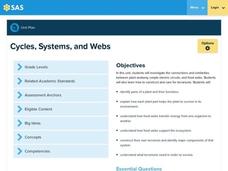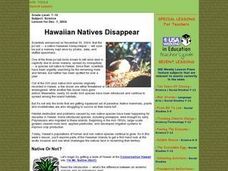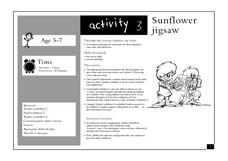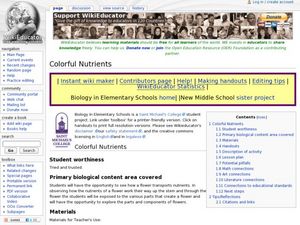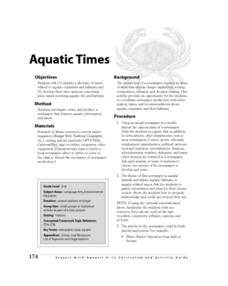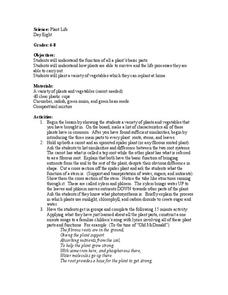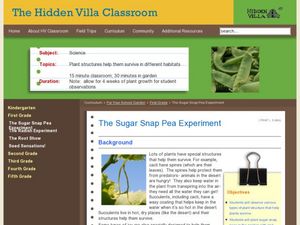Curated OER
Rainforest Plants and Animals -- Where Are They?
Students identify the plant and animals in the rainforest. Using the internet, they research how these plants and animals adapt to survive in this type of environment. In groups, they critique artwork and discuss how they were depicted.
Curated OER
Plentiful Plants Book Review
In this literature worksheet, learners choose a nonfiction book about plants to read and report about. They note the title, author, illustrator, and publisher. They follow five directions to draw and label plant diagrams, make charts,...
Curated OER
Seedless Plants- Ferns- Enrichment Worksheet
In this seedless plants enrichment instructional activity, student read about the history of ferns, their habitat, size, and structure. They draw a fern and label its parts including the fronds, pinnae, sorus, and rhizome.
Curated OER
Edible Plants
Students determine what part of a plant they are eating when they eat different fruits and vegetables, and make collages of fruit and vegetable pictures that are flowers, fruits, leaves, roots, seeds, seed pods, stems and tubers.
Curated OER
Investigating Crickets and Their Body Parts
Second graders investigate the body of a cricket. In this biology lesson students use tools to gain information about the insect the cricket. Students observe and identify features and describe how these features help the cricket live in...
Curated OER
Identify Plant Parts
Learners use the word processor to write about the process they used to grow a plant. They import a graphic image of their plant into the document they have written, then proofread their document.
Curated OER
Parts of a Cell
Students explore the parts of a cell. They identify the structures of plant and animal cells. Students explain the functions of plant and animal cells. They compare and contrast animal cells to plant cells. Students create a model of the...
Pennsylvania Department of Education
Cycles, Systems, and Webs
Fourth graders review the parts of the plant and their functions. In this plant lesson, 4th graders recognize that plants must transfer energy to make food. Students understand the interdependence of organisms in an...
Curated OER
Make your Garden Grow
Fourth graders role play as certified horticulturists as they study the biology of plants and gardening. They design a garden for their school based on what they researched and a given budget.
Curated OER
Ho'opiha - Growing in Knowledge: Terrarium Project
Learners explore environmental protection by conducting a research experiment in class. In this botany lesson plan, students identify the necessities for growing a plant indoors and create a small terrarium for their plant. Learners...
Curated OER
What is Cacao?
Students use the Internet to learn about the cacao plant. For this plants lesson, students complete a KWL chart on chocolate, learn about cocoa plants and discuss the parts of a plant. Students use the Internet to learn how...
Curated OER
Watch Me Grow
Students observe that plants need air, food, light, and water to survive. In this plant biology lesson, students observe the growth and development of two plants, one is the control plant and the other is denied either air, water,...
Curated OER
Hawaiian Natives Disappear
Students explore parts of the Hawaiian Islands to get a examine the exotic invasion, and see what challenges the natives face in reclaiming their territory. They identify the changes in the environment that have been the hardest on the...
Curated OER
Sunflower Jigsaw
Students recognize and name the main parts of a flower. In this life science lesson, the teacher leads a discussion about the parts of a plant, then students color and cut out the parts of a planet, then glue the parts together...
Curated OER
Colorful Nutrients
Young scholars participate in an experiment to understand how plants get nutrients. In this plant nutrition, lesson students examine how colored water goes through the stem of a plant to the flower. Young scholars discuss the parts of...
Curated OER
Aquatic Times
Students identify a diversity of issues related to aquatic organisms and habitats and develop their own opinions concerning some issues involving aquatic life and habitats. They investigate, write and produce a newspaper that features...
Curated OER
How to: Build a Plant Cell
Students build a 3-dimensional model of a plant cell with household objects. In this plant biology lesson, students construct replica plant cells in groups of three. After completing their projects, students share their creations with...
Curated OER
Lesson 3: Life Cycle of Brassica Plants
Students investigate the life cycle of brassica plants. For this science lesson, students observe each stage in the life cycle of their plant. Students record their observations and graph the data. Students
Curated OER
Plant Life
Students study plant parts and their functions. In this plant life lesson plan students participate in an activity of planting plants.
Curated OER
PLANT LIFE CYCLES
Student learns about the life cycle of plants by watching a time-lapse video. This activity provides students with further evidence that all living things grow and change as they progress through their life cycle.
Curated OER
What is the Function of Each Seed Part in the Growth of a Plant
Sixth graders investigate the parts of a seed by using a digital camera. In this botany lesson, 6th graders plant their own seeds in class and demonstrate the necessary attributes for growing a plant. Students utilize a...
Curated OER
From Seeds to Plants
Second graders review the process of plant reproduction and the role of seeds in that process. The students dissect a seed, analyze their finds, collect and record data, and make predictions about seed germination and plant growth.
Curated OER
The Sugar Snap Pea Experiment
Young scholars examine types of plant structure. In this plant biology activity, students observe various types of plants, such as ivy and grapes, and discuss the differences in structure. Additionally, young scholars plant sugar snap...
Curated OER
Pollination Power
Second graders study and examine the structure of a flower. In this pollination instructional activity, 2nd graders observe pollinators in the garden and dissect a flower. Students then plant strawberry plants in the garden and...







